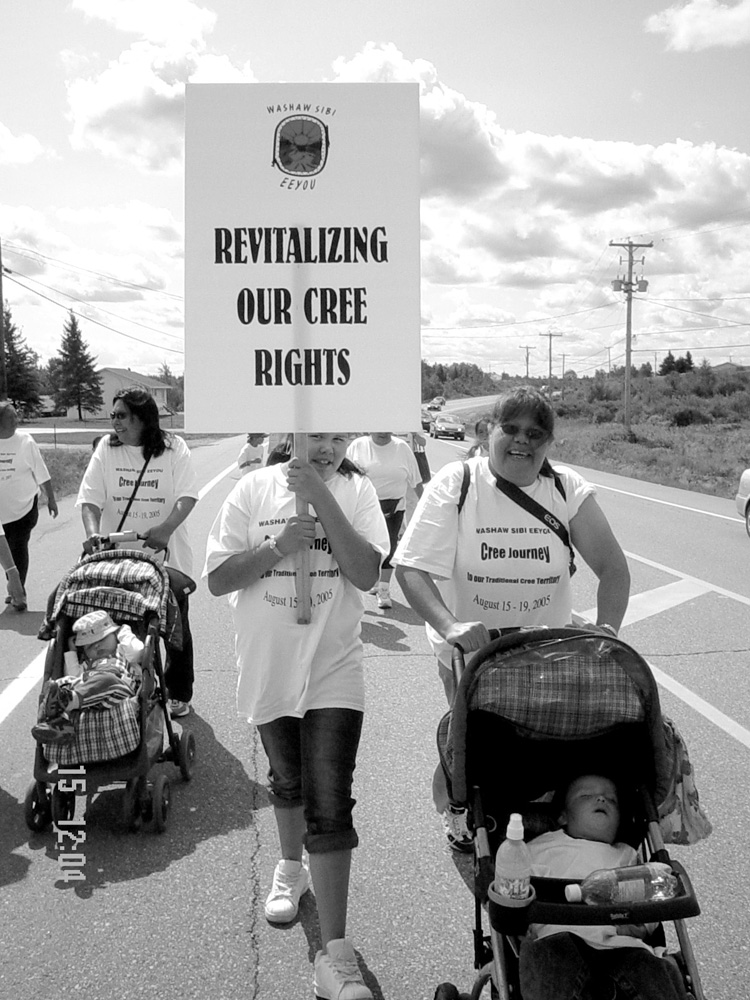
The Washaw Sibi Crees reached a new level in their fight to be recognized as the 10th Cree community this month as they walked 115 kilometres from Amos to an old campground that they hope will be their new home.
The Washaw Sibi Eeyou have been struggling to be included in the James Bay and Northern Quebec Agreement for years and the people think that this move will help force the federal government’s hand.
They marched to the former Joulac campground, where there are now 30 tents and cabins set up with more expected. There is a waiting list of another five people.
The walk, which took five days to complete, was an emotional one.
“It went very well,” said elected band council member Kenneth Weistche. “We got a lot of exposure and met a lot of people. We completed a very important journey and now we’re (concentrating on) finishing up the camp.”
The walk also had a share of bad blood. The Algonquins of Pikogan blockaded the entrance to their reserve to stop the Washaw Sibi people from getting in.
“I think there was a lot of miscommunication,” said Weistche. “The Algonquins weren’t sure why we were walking and might have seen it as something against them. It wasn’t. We just want to be recognized as a Cree band and have access to what other Crees have access to under the James Bay and Northern Quebec Agreement.
“I think both governments along with the Algonquin Nation are aware of our situation now and the media coverage helped that a lot,” said Weistche, who has been bombarded by radio, television and print journalists asking for interviews.
The plan is to set up a tent city and wait out the government in hopes of receiving a permanent land base for their people.
The Washaw Sibi Eeyou are hoping to gain access to more funding for basic services like education, health and job creation. They ended up in Pikogan for those same reasons.
When the Canadian government was setting up the Algonquin reserve of Pikogan in the 1950s, they told the Crees in the area to move there or be cut off from family allowances, health benefits and access to education. With little help, they had no choice but to comply.
Now they want what they’ve been denied for 40 years.
“There was a historical injustice done to our people when they were forced to live with the Algonquins over 40 years ago,” said Washaw Sibi Chief Billy Katapatuk. “We’re Crees, we’re not Algonquin and we want a place where we can be Cree and practice our traditions and learn our language.
Katapatuk added that the community’s elders and youth support the effort. “We feel great right now.”
He said that it’s up to Ottawa to make the next move and give them a place in which they can raise their children – and, most importantly, be Cree.
Katapatuk added that the municipality of James Bay has expressed its support for the Crees and have no problem with them trying to set up a community in that area.
“The mayors of the surrounding towns have called us to express their support,” said the Chief. “Everyone is very supportive, native as well as non-native.”
The town of Matagami even went as far as to pass a resolution in support of the Washaw Sibi. Amos has sent a letter to that effect as well.
“The walk has put us high on the agenda to resolve our issues,” said Weistche. “There were people that didn’t know that there were Cree people living in Pikogan and that even though we were Cree beneficiaries, we didn’t get any benefits or programs or services. Hopefully we’ve succeeded in letting people know what we want and why we want it.”

